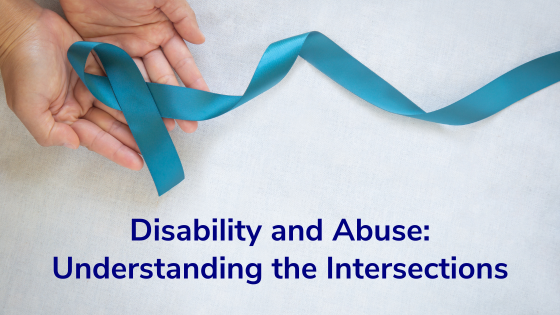Disability and Abuse: Understanding the Intersections
Carole Chee, Prevention Intern
According to The Disability Justice Resource Center, people with disabilities are sexually assaulted at nearly three times the rate of people without disabilities. Even more distressing, only 3% of sexual abuses involving people with developmental disabilities are ever reported. These statistics point to violent structures of power that enact abuse and silence survivors in highly detrimental ways. To thoroughly understand how these structures relate specifically to the topics of abuse and disability, considering intersectionality is key.
Coined by the groundbreaking feminist scholar Kimberlé Crenshaw, the term “intersectionality” refers to compounding oppressions experienced by individuals with overlapping identities, particularly connected to race and gender. For example, a Black woman has a lived experience unique from that of a Black man or a white woman because she experiences overlapping discrimination. Similarly, the intersection between abuse and disability must be approached with the concept of intersectional identity at the forefront of survivor-empowering discussion.
What does an intersectional approach look like?
The Center for Disability Rights defines ableism as “a set of beliefs or practices that devalue and discriminate against people with physical, intellectual, or psychiatric disabilities and often rests on the assumption that disabled people need to be ‘fixed’ in one form or the other.” Ableist structures of power that over-characterize people with disabilities—especially those who belong to additional marginalized identity groups—as ‘vulnerable’ and ‘broken’ shift responsibility away from abusers. As a result, all types of abuse (including emotional, financial, physical, and sexual abuse) become excessively normalized and accountability is misplaced.
With these dangerous structural misconceptions in mind, the next step toward positive change is adopting a survivor-centered, empowerment-based, and trauma-informed approach. West Michigan’s very own Disability Network Lakeshore embodies this approach, rooting its passion for advocacy in the belief that “people with disabilities are the most independent when they learn to speak on their own behalf.” Providing resources to help individuals with disabilities feel empowered to speak up and out, committing to inclusive practices, and breaking down the systemic discrimination that prevents these changes are all vital steps to pursuing equity.
Further resources
To learn more about framing abuse through a disability lens, we encourage you to attend Resilience’s upcoming webinar for Sexual Assault Awareness Month (SAAM). On Thursday, April 18, 2024 from 10:00 AM – 12:00 PM EDT, join us for a conversation roundtable on the dynamics of domestic and sexual violence through a disability lens. We will explore the dynamics of abuse and the use of power and control within a disability context. We will explore aspects of unhealthy relationships and tactics used to target one’s disability. Our roundtable panelists will discuss advocacy needs, supporting survivors’ right to self-determination, and encouraging healthy boundaries.
Panelists include staff from Resilience: Advocates for Ending Violence and Disability Network Lakeshore serving Ottawa and Allegan Counties in West Michigan. For more details and to register for the webinar, use this link!
